Japan: a country so common sense that it is irrational for us in some places

From the moment when you have an anime friend girlfriend, you only hear about Japan. What are there all strange. How cool is that? How you are slaughtered for an impolite word. And so on. For me, it was always ninja, samurai, yakuza, anime, the goddess Canon for the camera, electronics, sushi and tentacles. I think you can continue the list.
In place it turned out that all this is there, but this is not the main thing. These are just little things. The main thing is that if we ever build space cities, I know who will cope best. Because Japan is now a very technological and very green country. They managed in one of the most technologically advanced cities in the world to fit beauty into every little thing and keep the feeling that you are in nature. And the most efficient use of resources, including garbage. And at the same time, they are not bothered by the unfinished and incomplete world around - we only have beauty in the finished state, and they are also in the process. That is all the time.
')
And all this fierce crap that you heard about the country actually follows logically from the prerequisites that are in the basic cultural code. I'll tell you now.
Tongue
The Japanese write in hieroglyphs (this is a fork of the Chinese system) and in two syllabary alphabets: hiragana (chirokanoy) for their incomprehensible words, and katakana for borrowed words. Plus, occasionally use translit, about as often as we do. The syllabary alphabet immediately imposes a unique shade on imported foreign words. The fact is that there are syllables there, and there is nothing besides syllables. Conventionally, imagine that you have all the necessary consonants, but strictly in combination with some vowels. Therefore, the light will be “rito” And, yes, the letters “l” and “p” are the same (“the train is moving along the tracks”), “c” and “b”, and also “w” and “c”. This wild holivar about sushi or sushi was decided on the spot after the very first dialogues. They pronounce both letters - “c” and “w” - but multiplex them along the wavelength. Something similar is happening with the sound "u", but not so pronounced. Plus, the Katakana imposes a slightly Togliatti accent: “much” will be “macho”.
As a result, the beautiful Slavic name Svetlana = Subetoran.
Therefore, the entrance barrier to learning languages is large. Fortunately, when you manage to overcome it, that is, to start writing in a foreign language, then it’s easy. The sounds they repeat perfectly, and many people know English very cool. That is, you will meet or those who will be very difficult to understand because of the accent, or those who will speak very cleanly.
Geography
According to this Japanese-centered world map it may seem that there is only one climatic zone here:
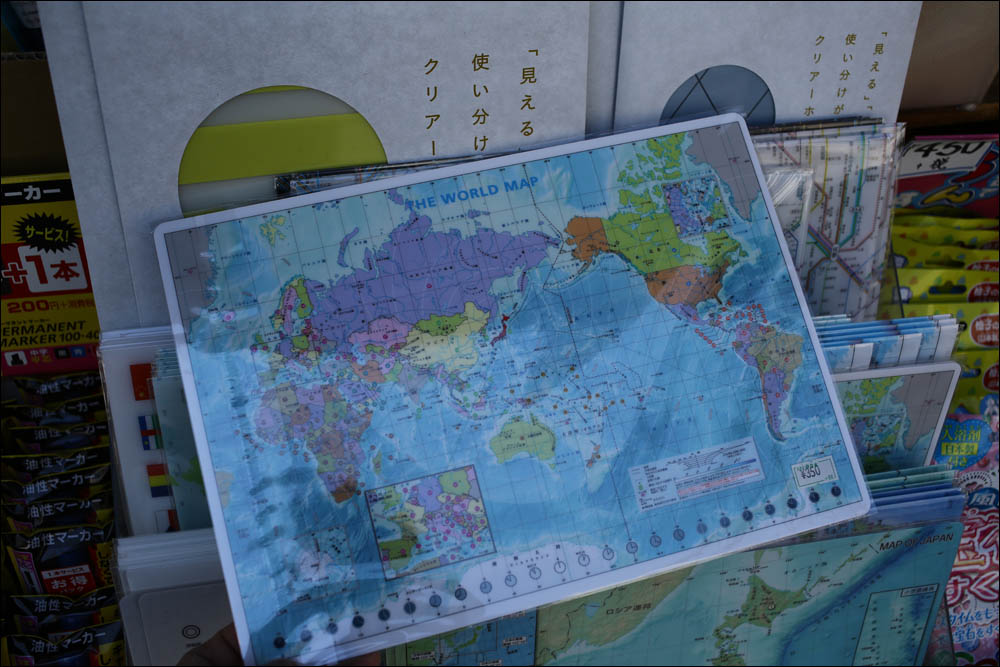
In fact, the northern edge of the country is close to our Yuzhno-Sakhalinsk, and the southern is already in a tropical climate with islands like the Philippines. But the warm current nearby makes the climate of the northern part of the country rather warm. The logical consequence is that almost throughout the country, low-rise residential buildings are built of sticks, plastic and drywall so that you can knock on the wall and punch it with your hand. That is, the temperature of the house corresponds to the street.
Why? Because the climate plus geological activity. Here there are several plates at once, so the activity is very strong, and it shakes constantly. Of the six thousand islands of the country, some disappear, some appear. Constructions are made with this in mind: somewhere they are earthquake-resistant and expensive, and somewhere if the house is built on you, you will shake off and build a new one in two months. Heating, respectively, air conditioning. There are old gas stoves, but they are magical: after them you need to air every couple of hours. The consequence is that in winter people wear top clothes even at home.
Modern homes already with warm floors. Because the main life goes on the floor - there they both sleep and sit. Chairs came into use relatively recently by the standards of history. But in a traditional house they sleep, pupating fully: a mattress, then a futon, then a blanket, then a Japanese, then again a blanket, and a feather bed on top.
Home light, so someone has long proposed to build them on an air bed. Seismic sensor, battery - and when the slider starts from below, the house takes off. It seems like about a hundred homes have already been set .
Urbanism and nature
All major cities are green. Wasteland 2 drew something like this - in contrast to the scorched deserts of Fallaut, where greens twisted the skeletons of skyscrapers. Well, there was no apocalypse yet, but there is greenery.
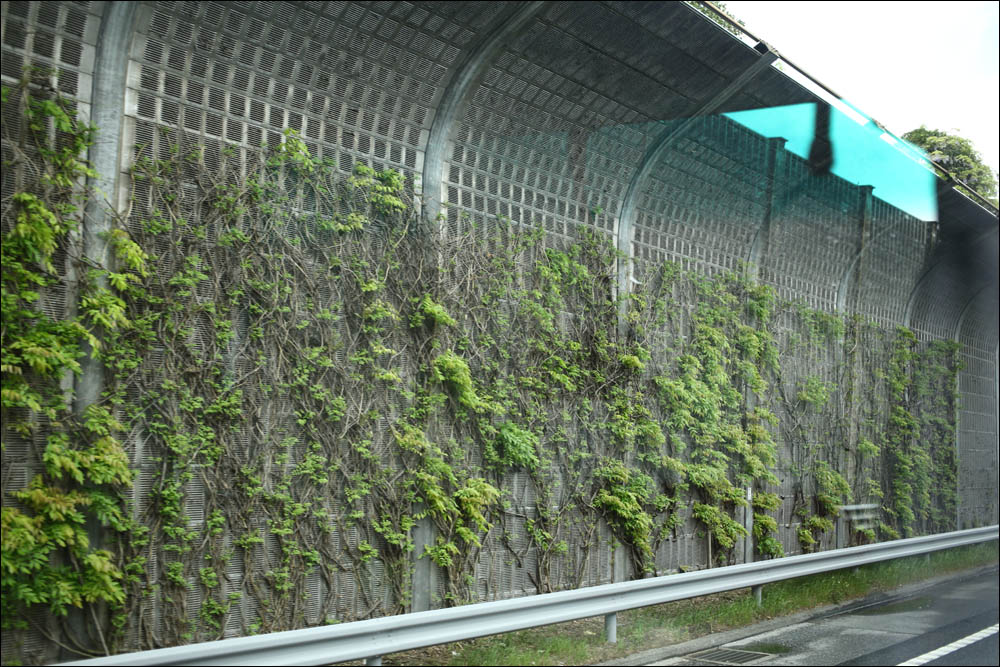

Buddha statue in Osaka, you need to make a wish and splash water on the statue. N years of iterations - and here we are.
Biology is very respected here. On the 1000-yen bill, Hideyo Noguchi is a microbiologist. Coins on the rise: cherry, rice, temple, chrysanthemum, sakura, pavlonia + bamboo and mandarin.
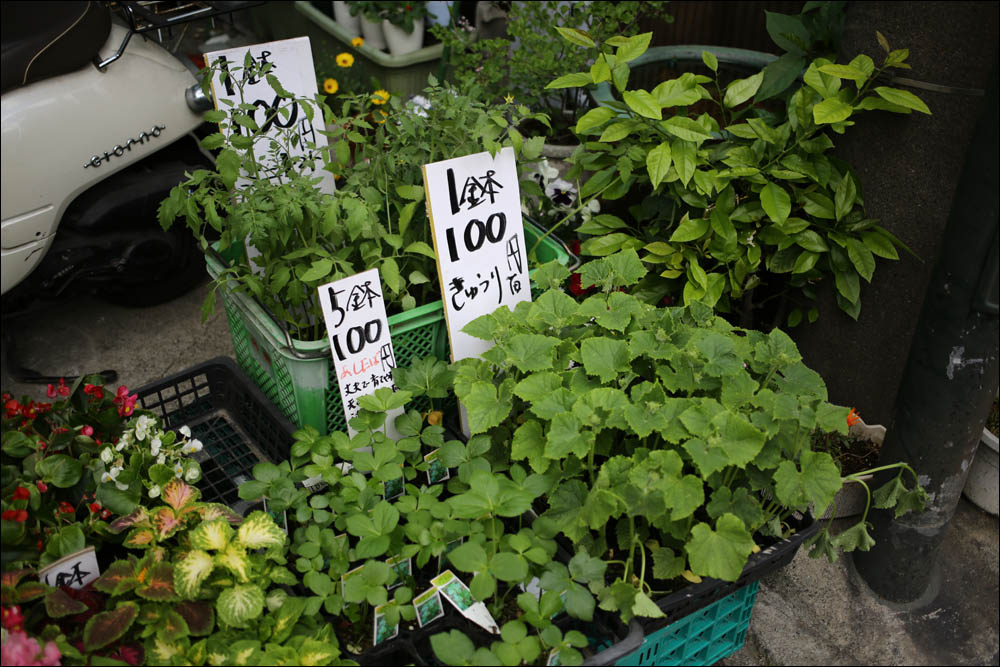
Shop on the street Osaka, all native.
In the center of the city almost everywhere there is a lot of greenery:
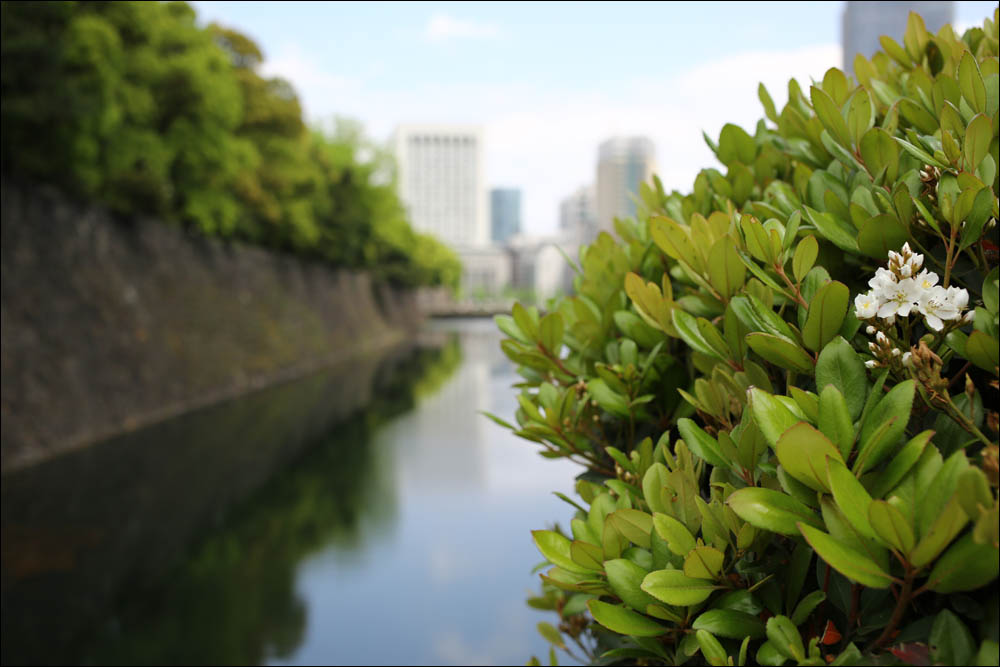
Outside the cities - all the land is used, there are simply no empty shreds. This is either land plants, or rice (as here), or a plant:

In the photo, by the way, an incinerator. More precisely, it is a very tricky thing, which has gone about 50 years into the future from the Moscow incineration plants. Garbage is sorted. And I was tired of dividing the bottle into three parts: the bottle itself, the cap and etiquette for different trash cans. After sorting, all that can be recycled will be reused. What is burning will be burned to generate electricity, and at temperatures when almost nothing will fly out of the pipe. Ash will be compressed and used as building material (they have already built one island).
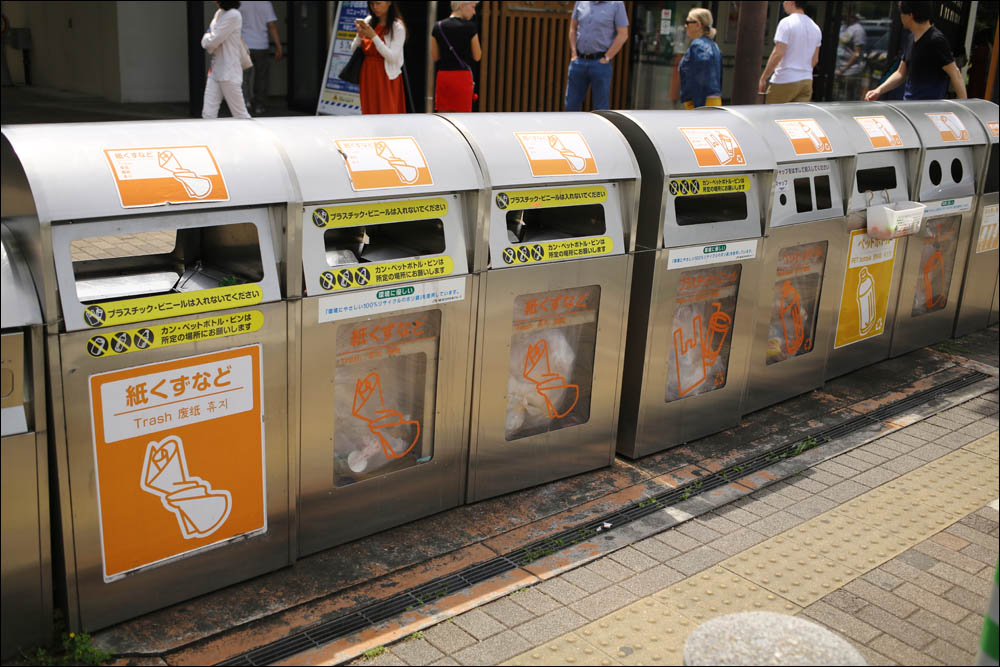
Appliances must be handed over to the store where you bought it, they recycle it for money. Furniture can be given at the request of the garbage truck. There are “happy days” when specific types of garbage are taken out on schedule.
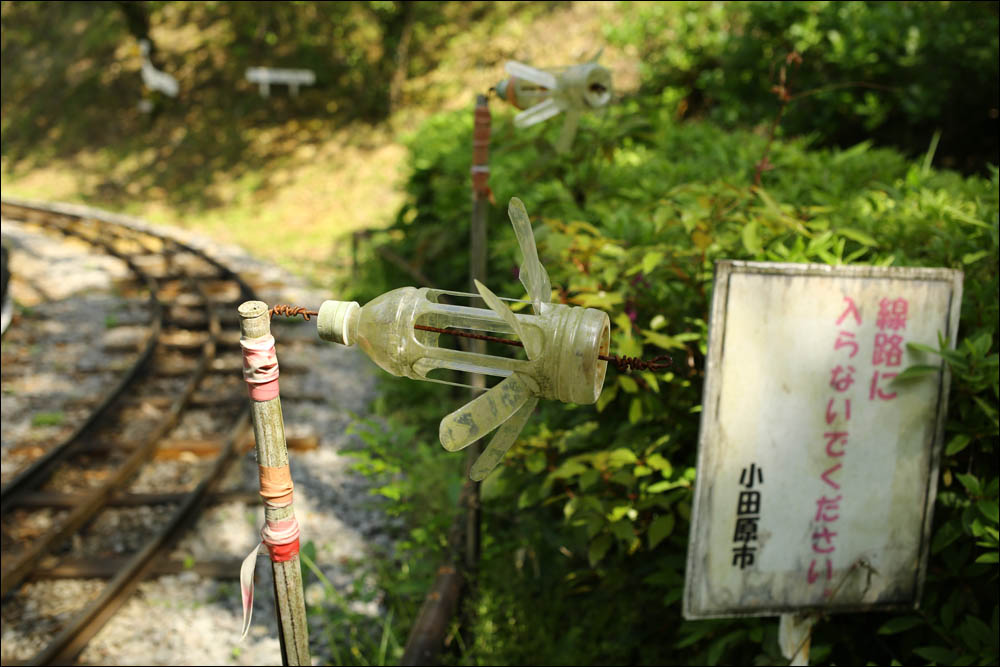
Even the most terrible things they do beautifully and reuse something. This is a scarecrow for birds.
It doesn’t really fit with the tradition of packing everything several times and is incredibly beautiful. Here, look:

Very touching: even when you buy yourself a boiled egg, it will be in a stunningly beautiful box, then it will be wrapped for you a couple of times and put in a bag. With cardboard on the bottom so that it does not lose shape. It all spends a lot of resources. Therefore, it is now decided that the processing of more than 90% is more important, and if you can not litter, it is better not to litter. Therefore, there is an institution “use the thing to the end”. It is combined with a cultural code. Here, the school uniform. It is sewn to order, and there are special threads that need to be pulled out and ripped open so that the form grows and grows with the child. If a little underpay for the form, or if the child blows more than necessary, then the boys will come to the prom in breeches, and the girls in miniskirts. A normal school backpack can cost about 50 thousand rubles, but is used all the years from beginning to end.

Urn in the city almost there. When I returned to Moscow, the urns of the Botanical Garden seemed to me the most terrible desecration of the beauty of nature. However, when I re-assessed that all the garbage should not be carried with me, I liked it again. It remains to make them beautiful and not after 5 meters, and there will be a compromise. And yes, the garbage in Japan is not abandoned. That's just not throwing and everything. For 10 days I saw two banks on the ground, and that, in tourist places.
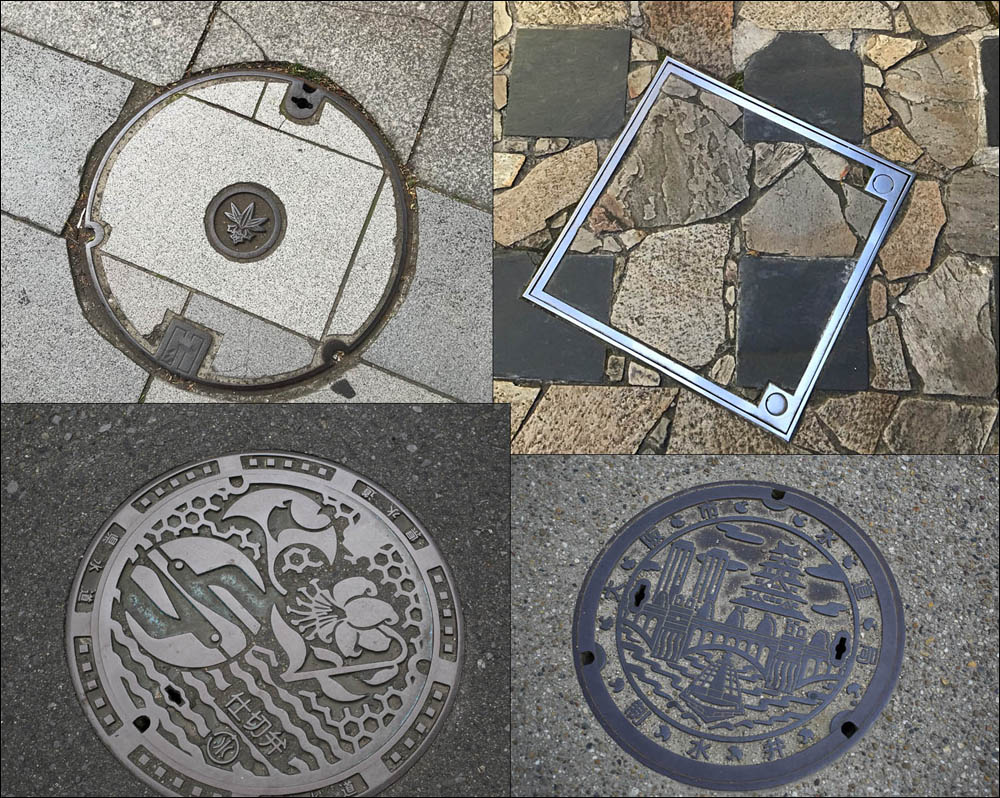
And this hatches. They are beautiful or disguised.
Features of cities
It seemed to me that there was not enough space in Japan, and they were fighting there for every scrap of land. But no. The first glance at the rice fields proved the opposite. There are mountains, untouched forests on them. That is a lot of places. But it is because of the mountains that the most convenient places to live are bays. The population is distributed along the edges of the islands, and most of all people in Tokyo. Here there is a high population density and buildings.
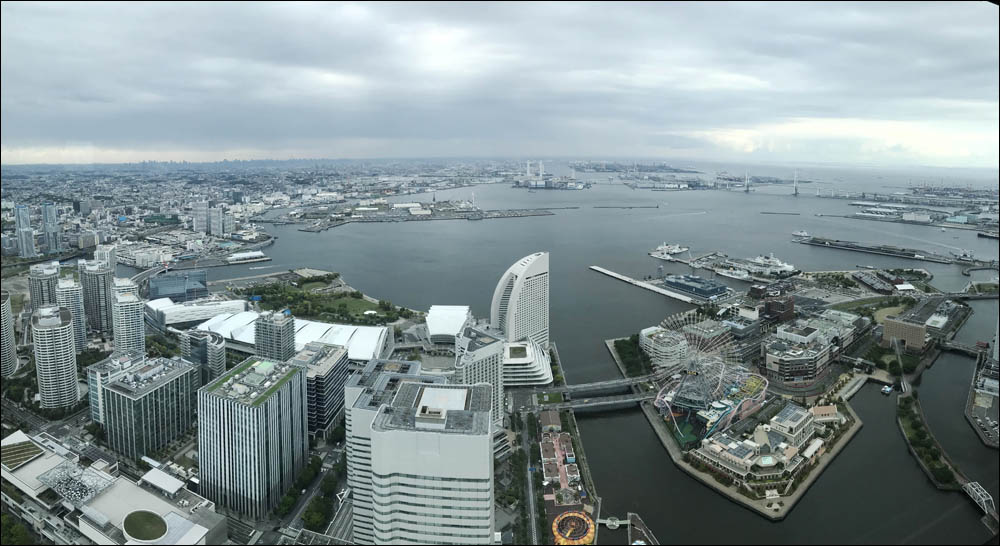
If in Shanghai there were four-level junctions and two-story roads, then here you can safely add a floor. And better two.
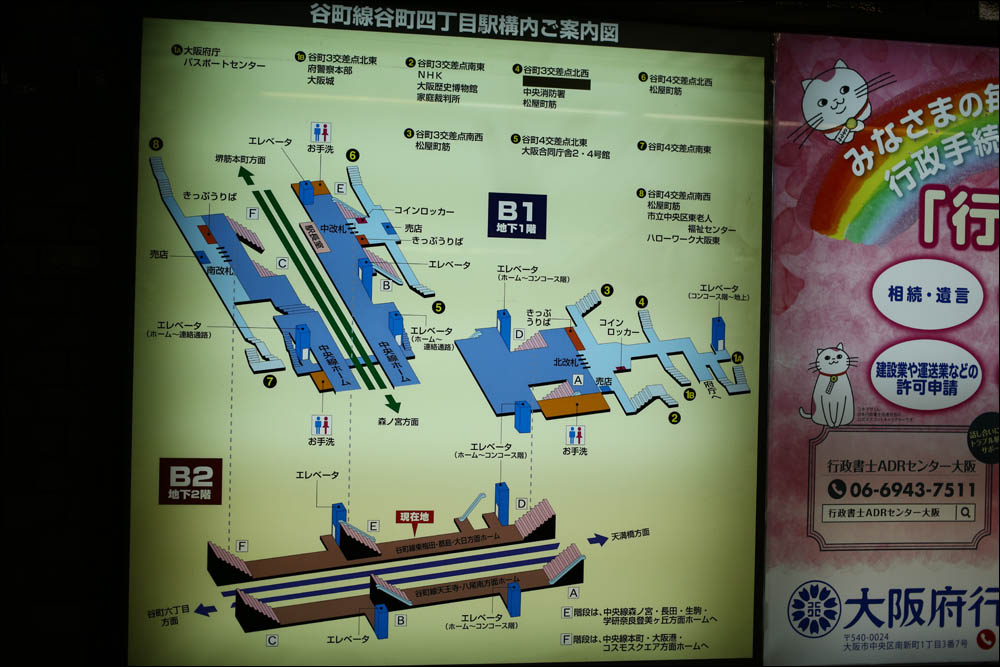
Without such a metro station scheme, getting lost is a bit of a fig because it is one of the smallest stations.
Than decided to donate - this is a cemetery. They are very compact. Everything is cremated and clustered.
More production. Almost everything is outsourced:
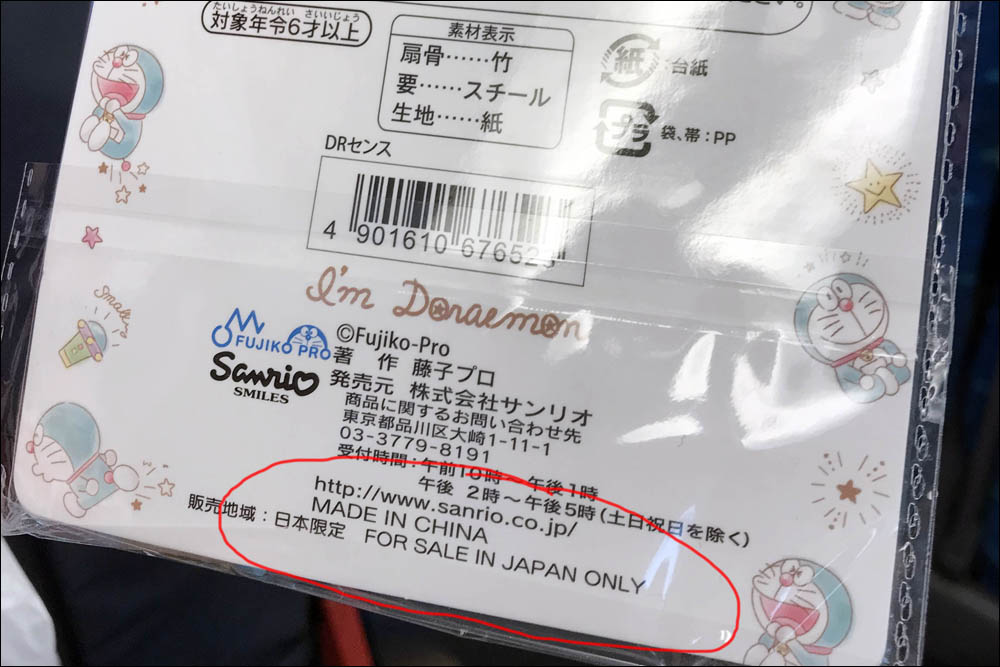
And look at how such a clearly empty space is used like a river. What is it just flowing? Let's build a track on it. Or make a stage there for performances. Or let the restaurant be:

In fact, a lot of crowds. Queues, dense metro, attempts to squeeze even to the station in Vykhino (excuse me, at Shinagava) - this is all there is.
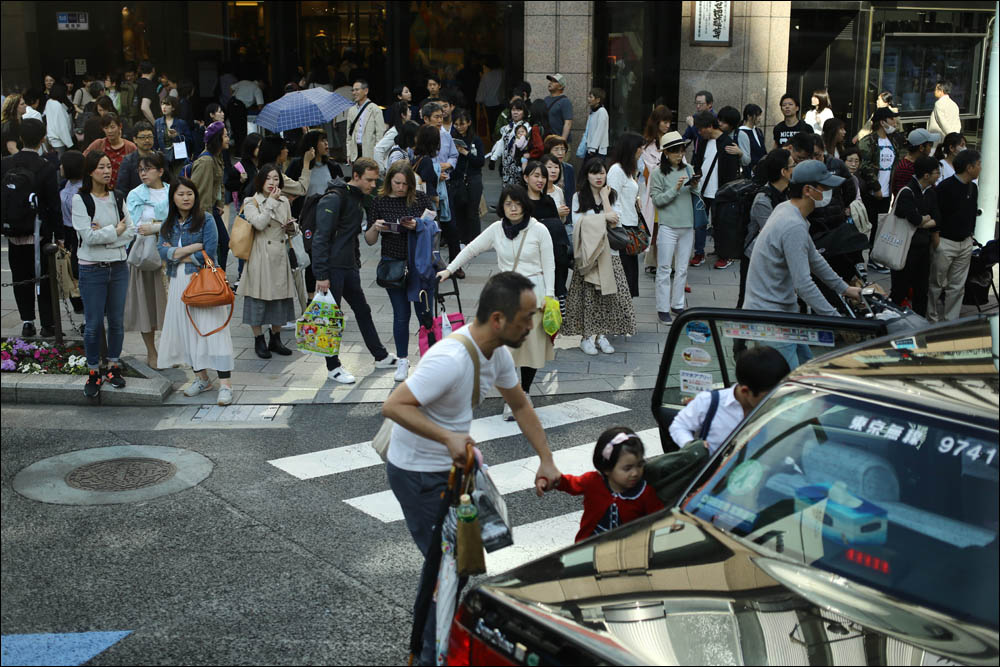

Specifically, there is such a crowd here, possibly due to the fact that I came to the holidays of the emperor's shift, which happen a couple of times over a century.

Every time there were a lot of people around, I got a set of skills acquired in China. But this is the wrong set: you can’t touch anyone here and don’t have to keep track of your things. Because they do not steal. At all. Well, that is, there were such cases, but for someone to personally encounter - no. It is absolutely normal for girls to put bags, telephones and wallets on the tables in the food court of a shopping center, take a bill and go pay for ice cream through the whole hall. Or someone dropped the wallet, it lies on the street and is waiting for the owner:

In the evening, the shop owner in front of him will take him to the police. If in 3 months no one applies, you can keep the money. It turned out that just watching things takes a lot of resources in Russia. No paranoia about personal security is happiness.
By the way, tickets to museums and other places do not spoil. Because most often you can go again. To give your ticket to someone else, probably, it occurred to someone, but if you break the law - the shame for the rest of your life is the same.
The next thing that catches the eye is that so many people wear respirators. From ordinary gauze bandages to curly masks.

Why? Conveniently. Protects from the sun. From allergies. Anonymously. Apparently, for the same reason, they almost do not use credit cards (or so culturally) - in general, I hardly use them either, so everything is familiar.
The Japanese reinforced concrete follow the rules. Themselves form queues at stops and stand in them. It is law-abiding in half with politeness.
Judging by the strictness of the laws regarding the possibility of receiving a SIM-card, the state actively monitors your movements through the cellular network. Buy a sim card to a foreigner is a difficult quest. It is much easier to rent (at the airport they give a 10-day rental right away without documents).

Solar panels are almost everywhere. With private you can download electricity back into the general network.
Separately worth noting toilets. As you can already guess, in Japanese toilets it is very cold, like everywhere else at home. But everywhere at home a Japanese man walks in outerwear, and then his ass is frozen. Therefore, when the first toilets were delivered, the engineers immediately supplied them with heating. And since there is already an electrician there, then the rest can be finished - an analogue of a drinking fountain instead of toilet paper and more functions so that the control panel of the toilet resembles a remote control for a space plane.
Yes, the bathroom and the toilet are sold by the module and are simply inserted into the house of the type as we put showers. And in Japan, a cabin is a container with a room and all communications in the walls, furniture and other things. It remains only to supply water and food, everything else is already inside. Includes soap and shampoo container if ordered.
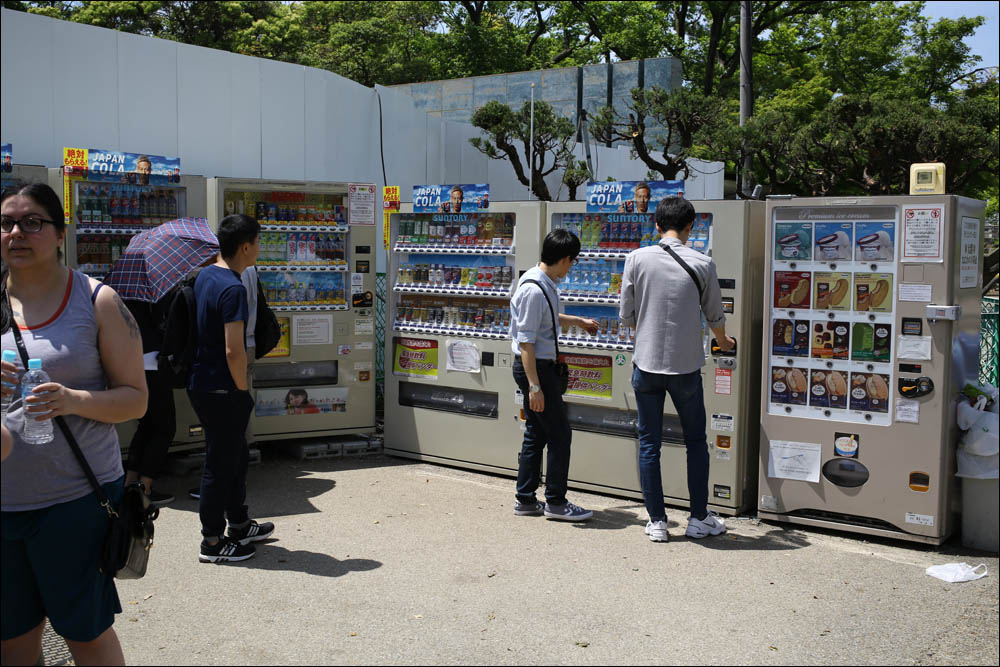
These are automatons. They are adored here, they sell a lot of things. By the way, an important point is that in the vending machines, that the prices in the shops differ slightly. Even in tourist places. Even in the clean zone of the airport.
Japanese society is very old now. Right on, as far as other countries have ever gone. Because a very high average life expectancy, and old people who should have already stopped receiving a pension are still cheerful and cheerful. Here are the WHO statistics on the Russian Federation - live for men up to 66, for women up to 77. Japan report : add 15 years to each boy and 10 to each girl. However, I would not say that they are directly medical fans. Just doing on time. Eat without fanaticism. Without vaccinations, schoolchildren will always take sports to school, before and after classes, after 40 they send regular agendas from hospitals to undergo preventive examinations, very expensive medicine (but insurance is an important part of a working contract). Many helipads for ambulances. By the way, the ambulance itself does not say “wahhhhhhhhhhhhhhhhhhhhhhhhhhhhhhhhhhhhhhhhhhhhhhhhhhhhhhhhhhhhhhhhhhh? But she says so much so much so much with her as“ wahhhhhhhhhhhh ” Because politeness. And all the others are inferior, because this is the rule. But it was important to be asked.
Mirn left a comment describing the professional survey here.
Of the last things, I was struck by this news about old people who volunteer for the liquidators of Fukushima. There is no sacrifice, but ordinary rationalism. The grandfather of 72 years old confidently informs: they say that he is already old, he left to live by the expectation of 13 to 15 years, and the cancer develops in 20-30. Therefore, even if you manage to grab a dose, it does not really matter.
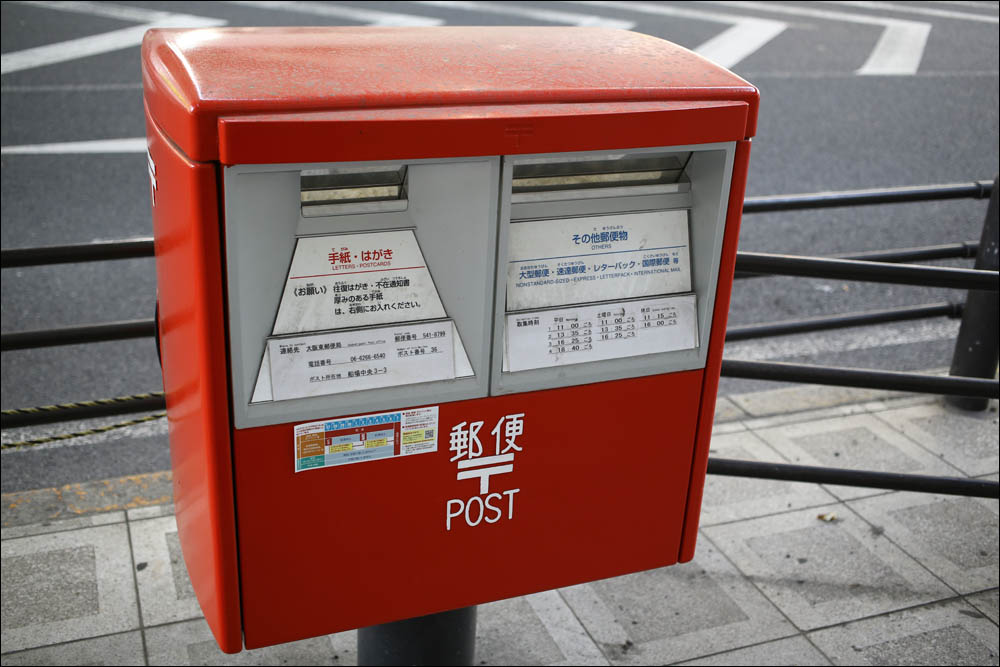
Mail is holy! Of all the cards sent from all over the world, it was the Japanese who got the fastest.
Food
That scared me the most. Raw fish. It turns out, if you do not know that this fish is raw, then do not worry. Yummy.
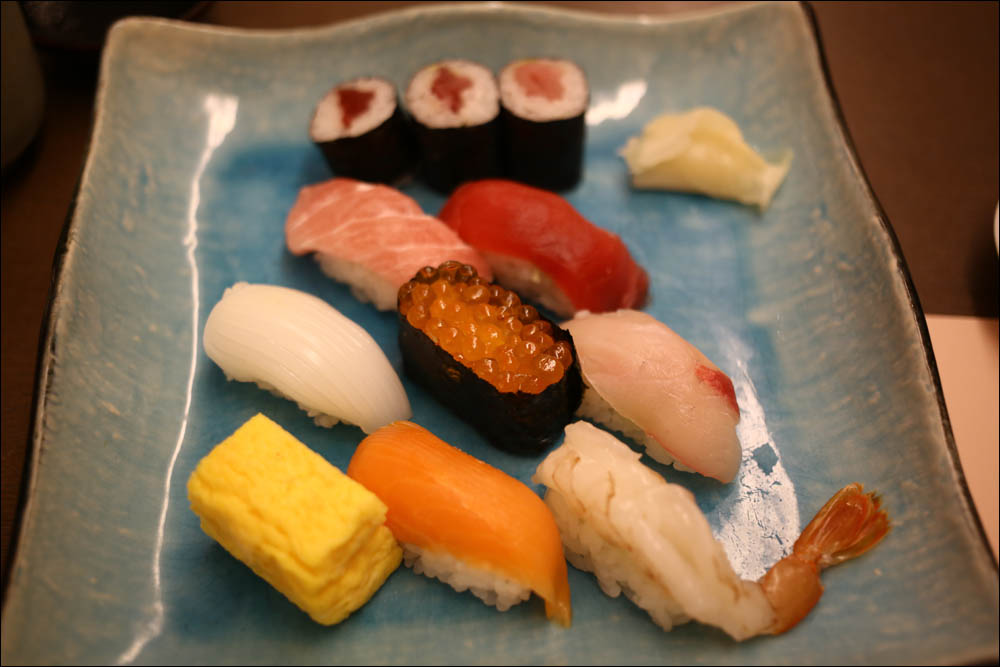
On the third day, familiar things appear everywhere. Here is an omelet:
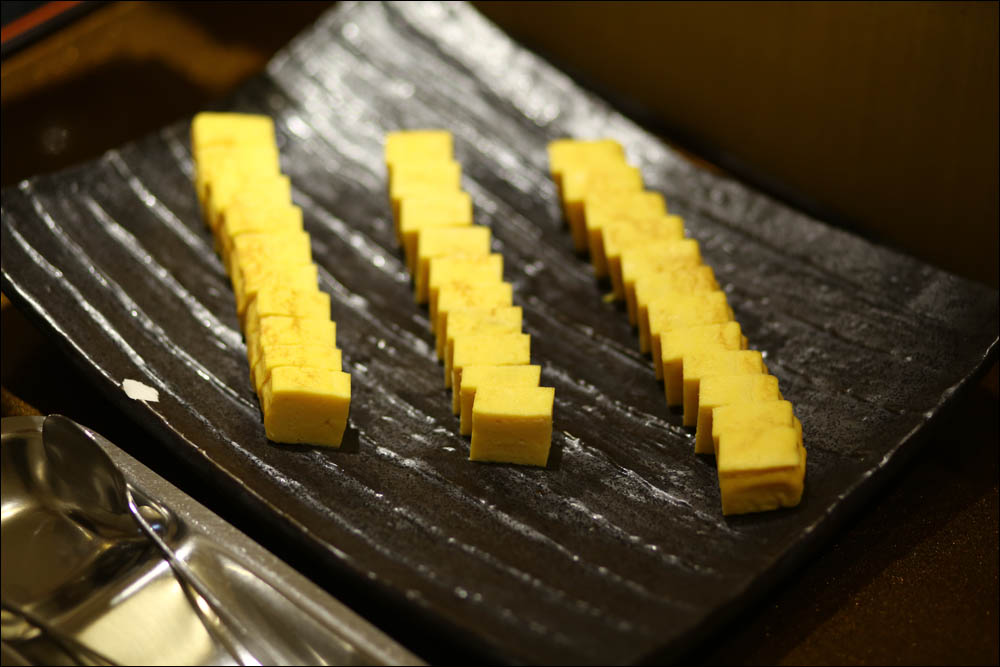
Here's a steak (and don't say it's not in Japan!):

Here are business lunches:
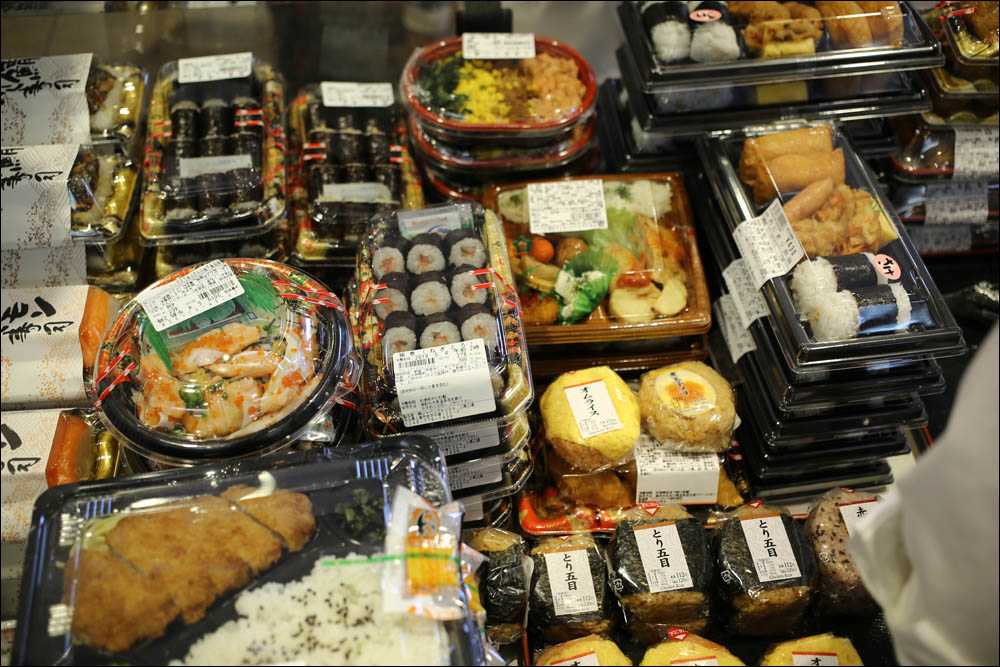
But sweets:
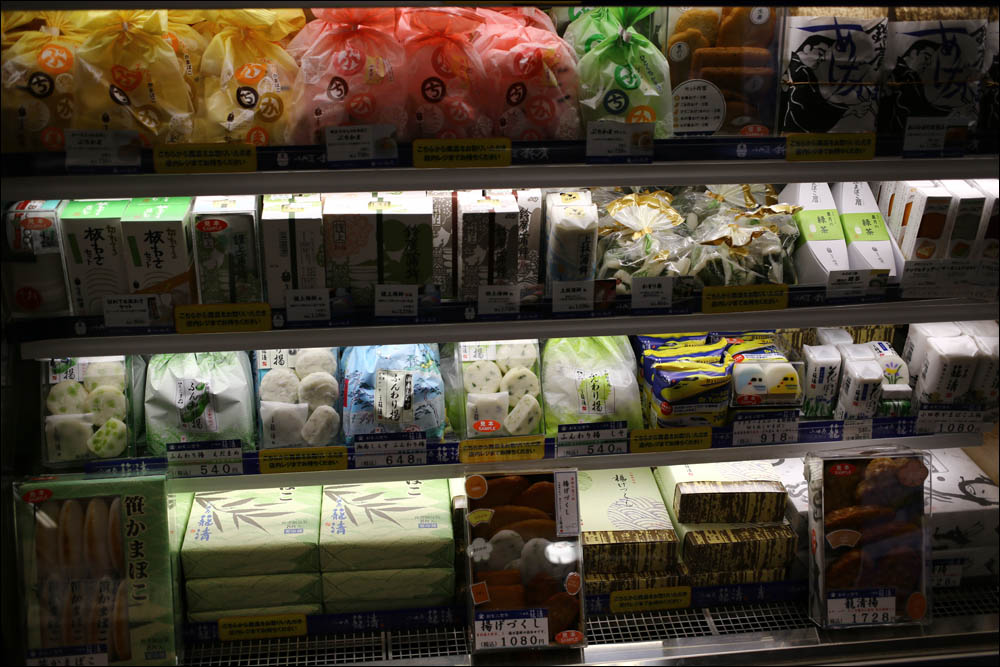
By the way, sweets are not real. Demo samples in polymer windows. Like food samples in the windows of restaurants. There are even special shops of fake products. Here is one in my channel .
Personal life
On average, the Japanese are very sociable and friendly, but only in a given cultural environment. Here's a simple sketch for you: I sat on the outskirts of the city in a bar with simple hard workers. We very quickly got acquainted even without knowing common languages, and then we began to show pictures of each other from the phones. So, the five people next to me in the phones were extremely empty. Only their ship. Vessel. Again the ship. Holiday on the ship. Seagull with a mark flew. Vessel. Bridge. Repairs. Vessel. And so 10 years. Before that, there simply were no telephones. Another one has the same picture with the over-casting of airplanes. By the way, when I showed him with my fingers that type-3 de-icing fluid wasn’t needed by normal people, he was happy as a child and even touched with approval. They broke down on Maiko. More precisely, on maiko-san (apprentice geisha). Got serious and straightened missing ties.
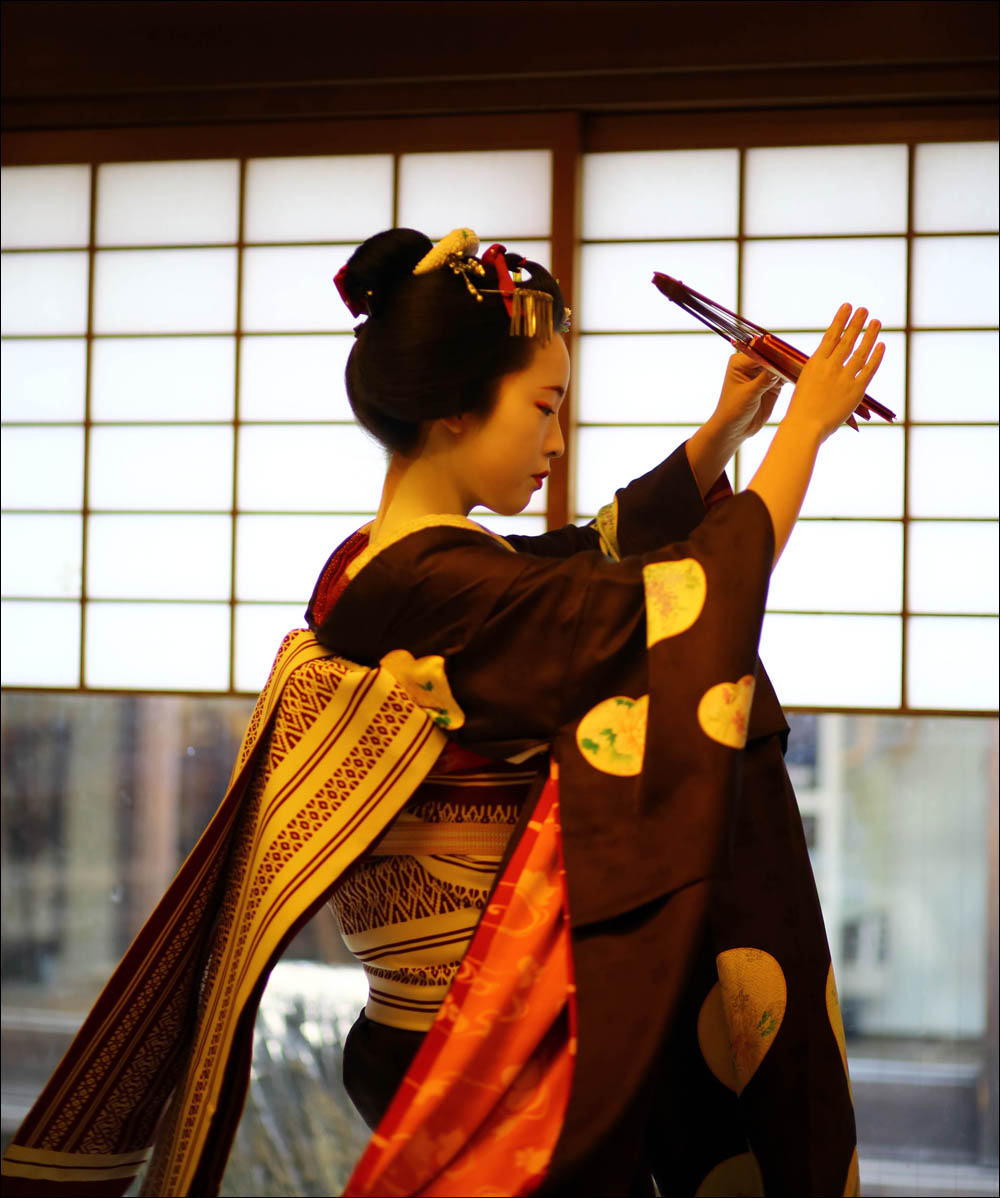
Maiko from the ambulance service on duty, just comes to communicate. He knows how to say yes, he knows art, and he says that he can support a conversation on any topic. About the ideology of open source code, unfortunately, knows nothing. Not any. But during training, they deprive her of the telephone, and she writes paper letters to her relatives.
In 2009, mcgregor wrote about how the Japanese office looks. All the stereotypes about processing and so on are true, but with the understanding that everything is already being rebuilt into a Western style. So, this period was an economic breakthrough, something like a five-year plan, which is necessary for four years. Now there is recycling too, but people often just stupid in the office. Therefore, the new technology - to de-energize the building at 20:00. For example. The story of a career in one company is also blurred: some companies stick to it, and some do not. And ready to take the "traitors" who left their old clan. But the university can still own the infrastructure from kindergarten to prepare future students. The mentoring institute also works: Senpai at work may be younger than you. And at school just a year older.
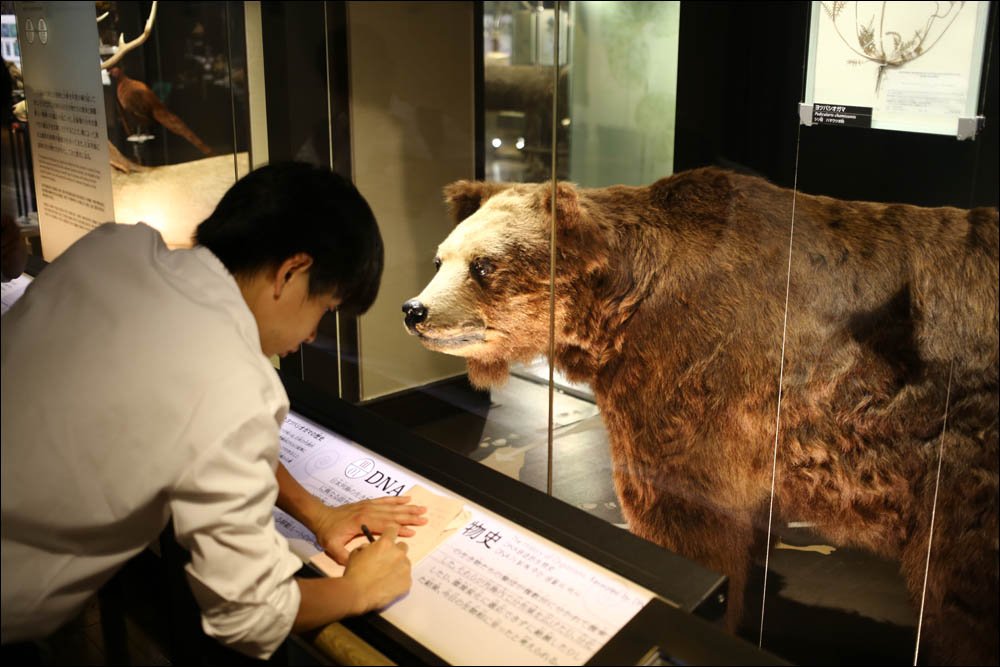
The first time I saw schoolchildren who came in a crowd to the museum and wrote everything down.
There are also hickey who sit at home. It seems to be up to 7% of the population (unconfirmed data). Just because well, to her hell, social life.
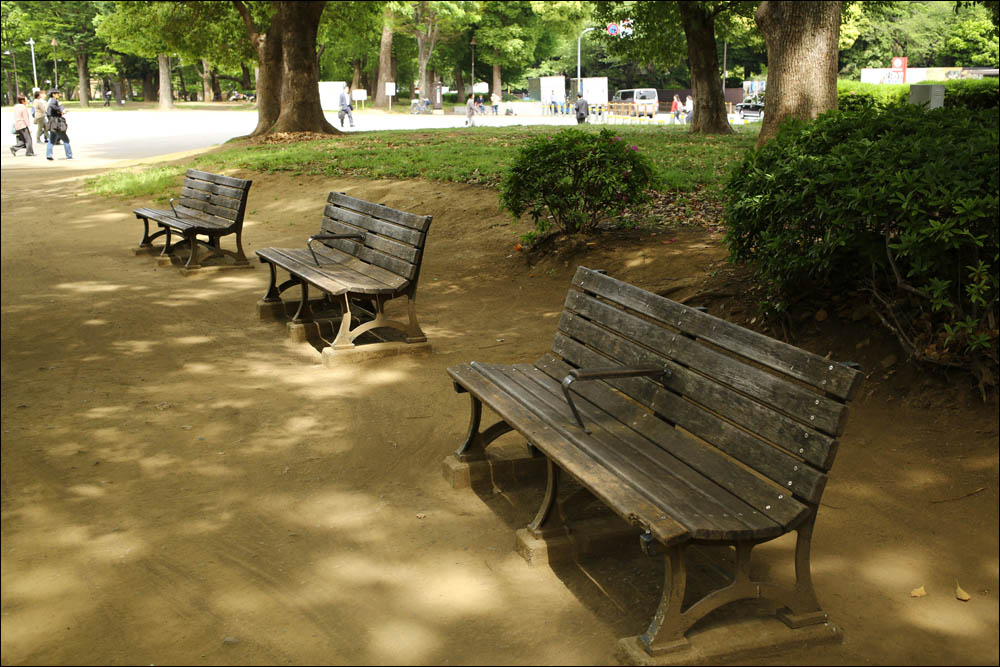
Japanese women usually end their careers with childbirth. Then there is a complicated scheme, when she can work 4 hours a day and not fall for the local personal income tax, and her husband gets retirement benefits for it. If the spouse dies, by the way, the spouse continues to receive his pension. What I like most of all is that it became fashionable during such a sitting at home with a child to improve - to study art and form a husband, for example.
Norms of politeness and the structure of education-education does not allow just to meet on the streets. In general, the only more or less free social action is a concert. There is much you can. All the rest of the time, you must observe the line.
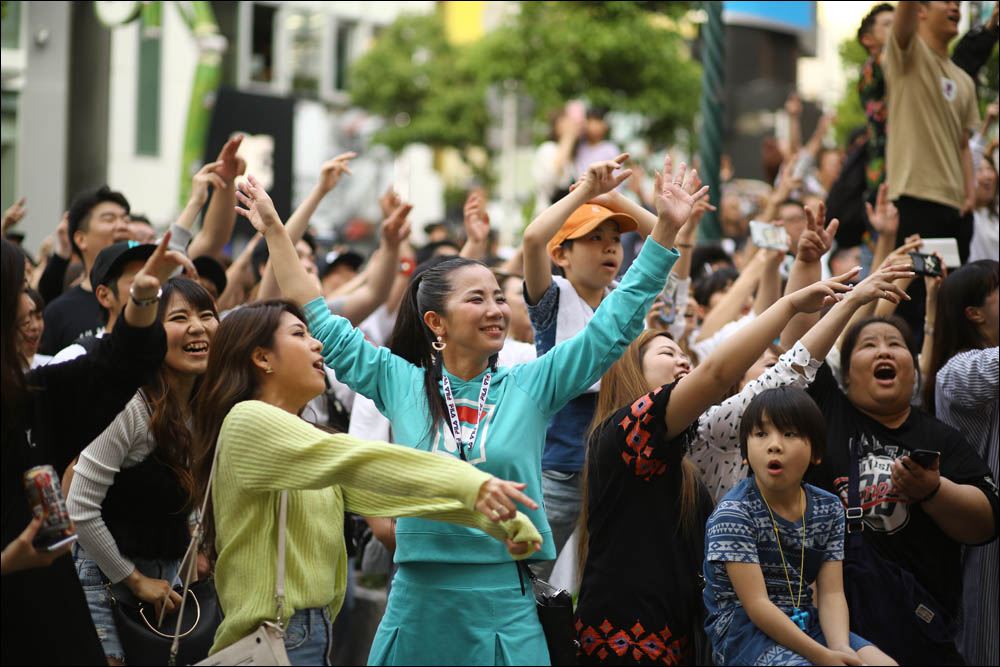
Given that classes are mixed every year, it is assumed that you will have enough friends at the exit from school. In practice, it may be that you do not really get to know anyone.
26 percent of Japanese under the age of 34 are still virgins. At the same time there is no body shame, but there is a fear of approaching a man of the opposite sex.
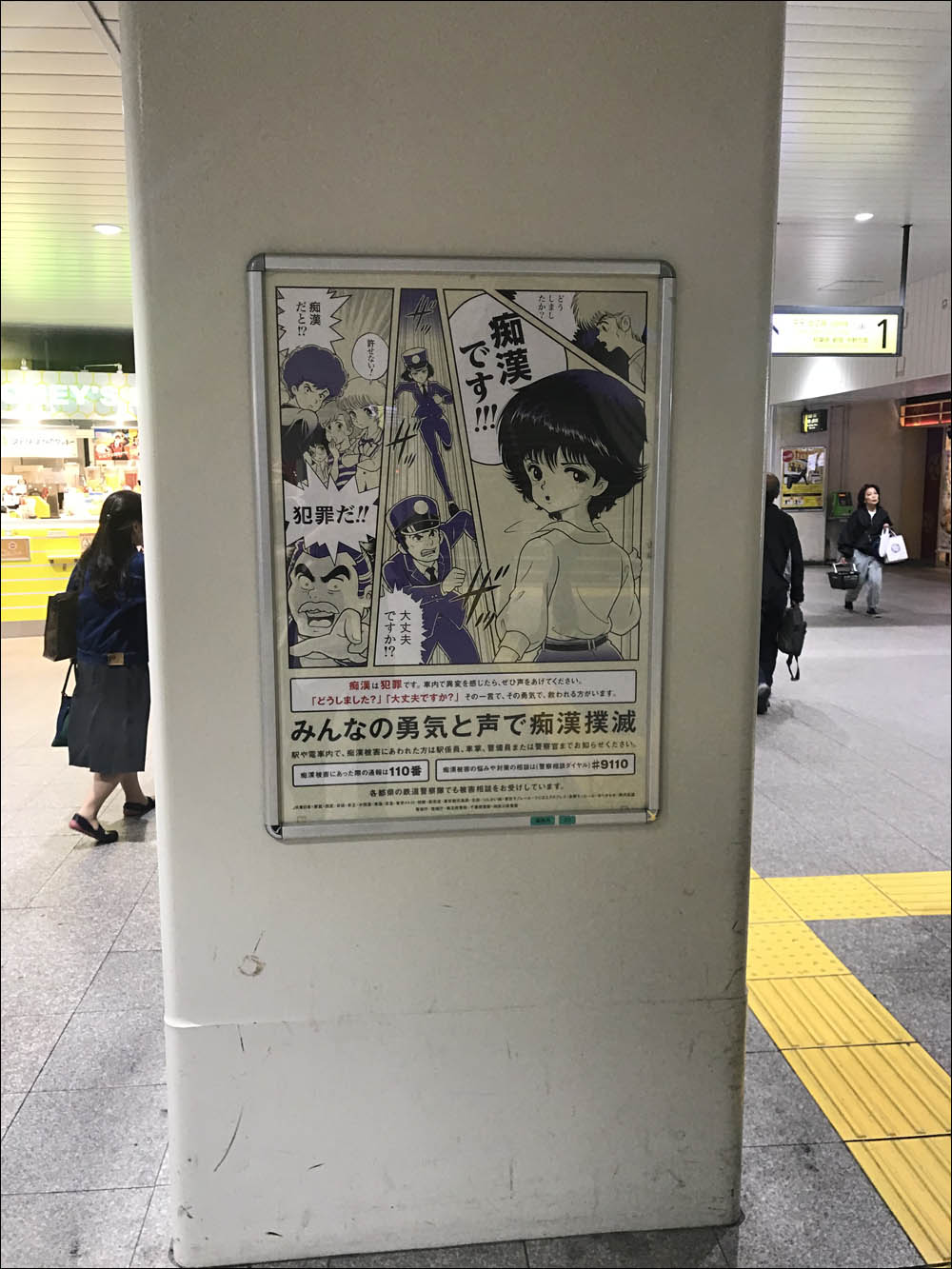
"With a loud cry and courage, we will defeat the perverts in the subway!"
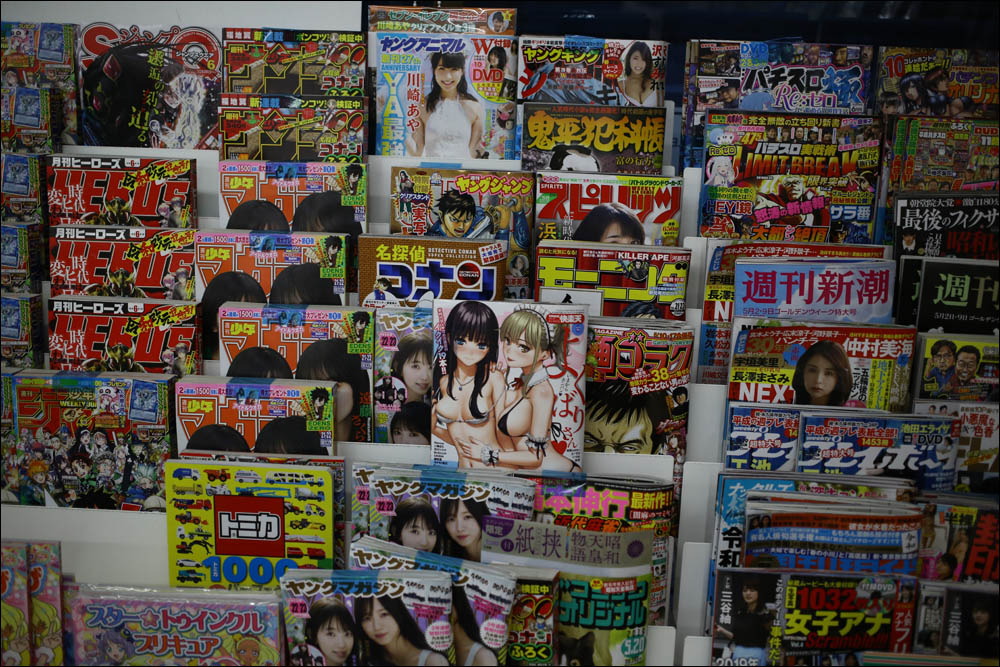
Is logical
There are homeless. That's how they live:

At the same time they wash and lead the Diogenov way of life. On the whole metropolis of their couple of thousands, and almost all ideological.
From communication with our expats and local fixers, I roughly realized that we were terrible looking for them, but at the same time quite open people. Many kosyachim, we do not understand the obvious things, but when communicating, we suddenly find ourselves a little more versatile than they expected. Because (again, my impression) all Japanese are very, very, very focused on their field. That is, if on the Azores a resident of one island knew almost nothing about the other, here the same applies to some basic things. At the same time, they learn very quickly, if necessary - this is proved by history, when advanced technology was made from a lagging country.
In a drunken state retain friendliness and joy. So this is not hypocrisy, as it may seem. But “loyalty” to a friend is not particularly here: if it is advantageous to substitute, they will substitute. Again, according to expats. What is the reason - I can not say for sure.
The most interesting thing is that the society is still almost clan (the work is “we”, there is no “I”), but each of the Japanese is an individualist. It's like a flock of birds, where each keeps a clear distance from the others, but everyone does the total. It starts with school, I guess. Even with how they go in a single file, a column of students gathers throughout the area. The older ones go in front and behind, the younger ones in the middle. Scary to break off and go alone.
Slides
Build and crowd:

When the work of a living person is expensive (and it’s very expensive here), automation is used. This devil-car carries trays around the restaurant:
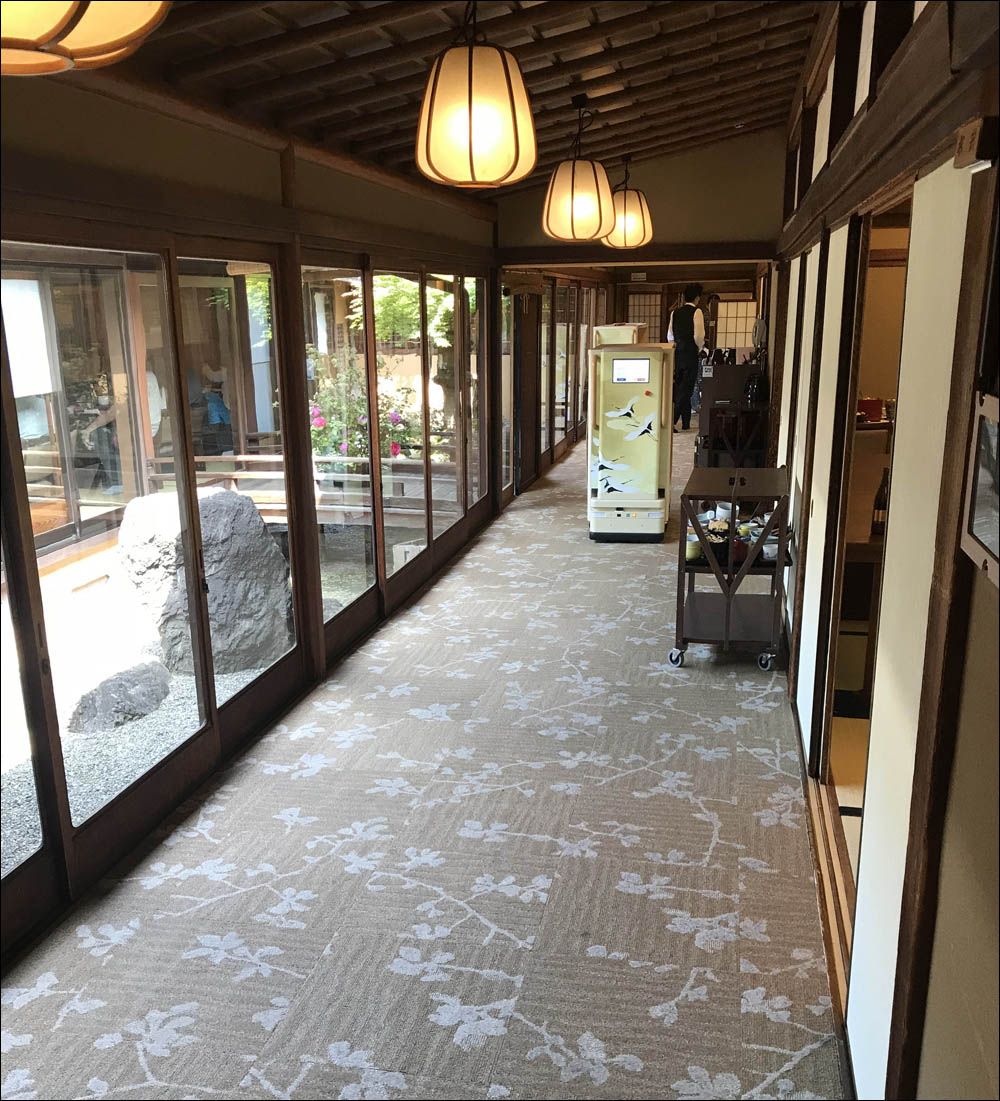
The engineer is equipped with everything necessary, to come without a tool is an unheard of thing:

Mash of wires:
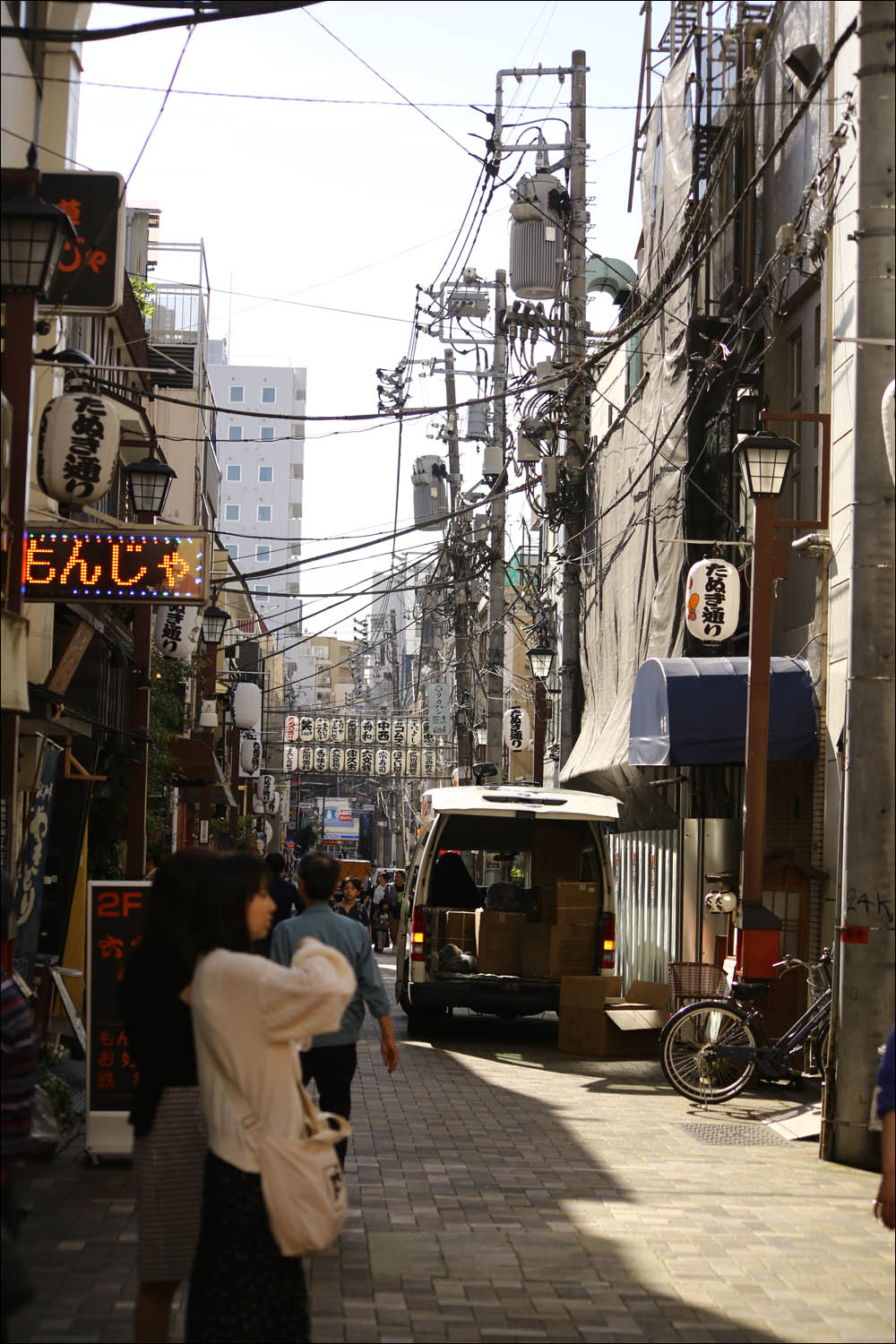
Fuji-san, of course:

You can buy a sheet of paper from which to extrude and glue it like this :
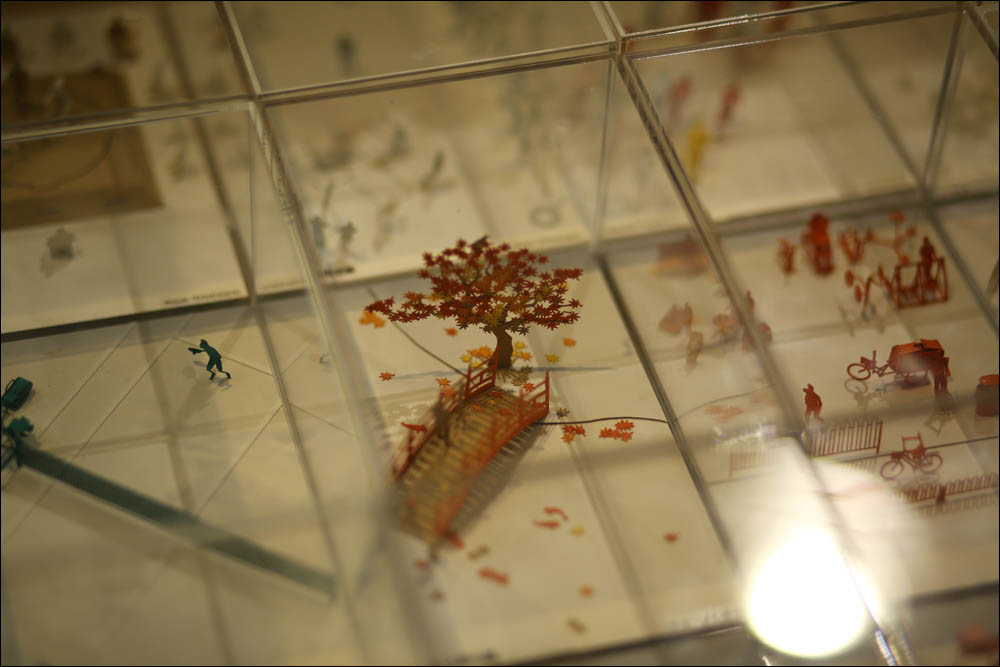
Lady 2 hours lured seal to take off. And this is just what I saw:

Navigation on paving slabs corresponds to reality:
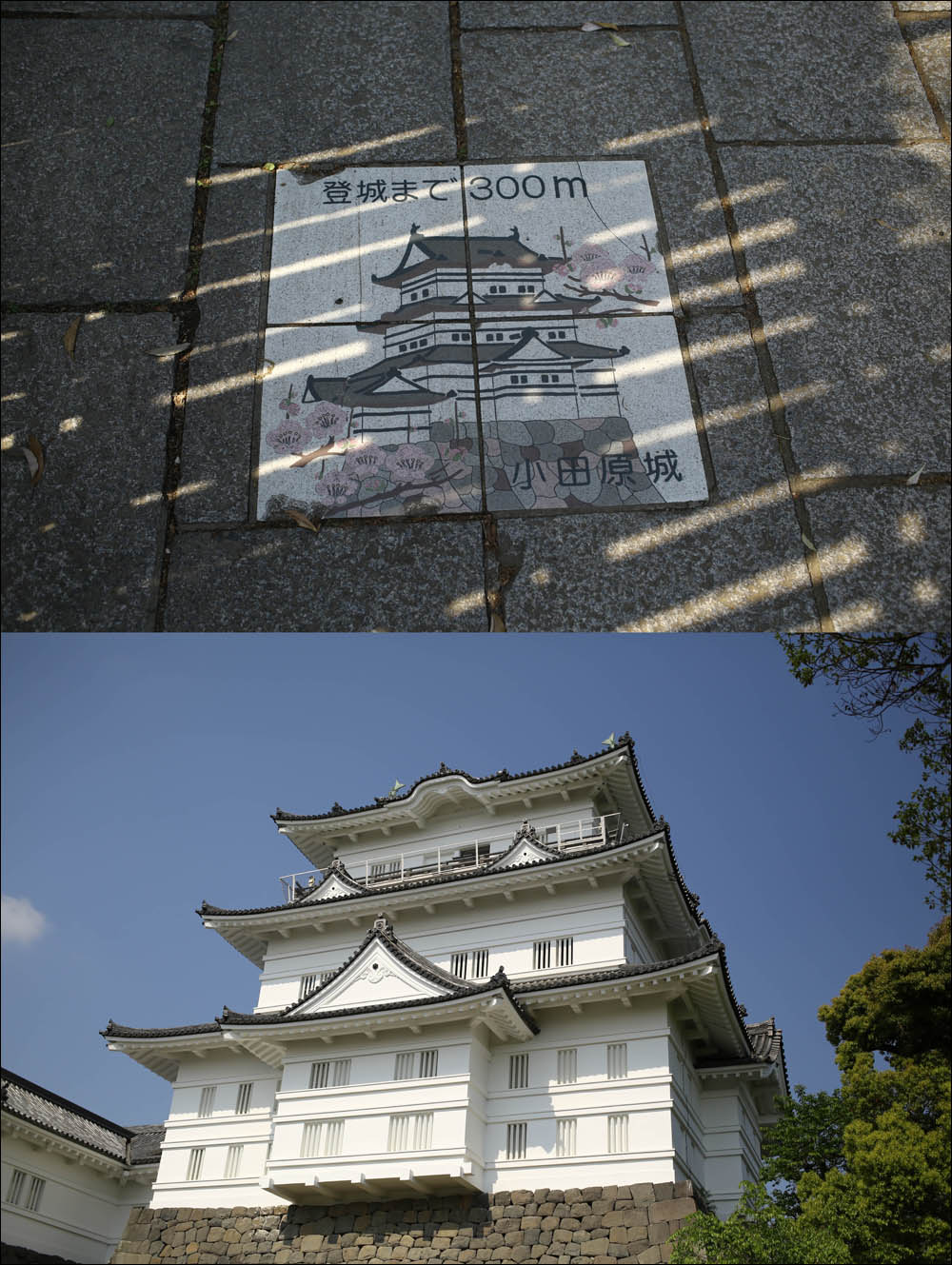
You can ride a train like this: fast and expensive. In 2017, one of these trains left 20 seconds ahead of schedule, after which the carrier offered his deep apologies on television.
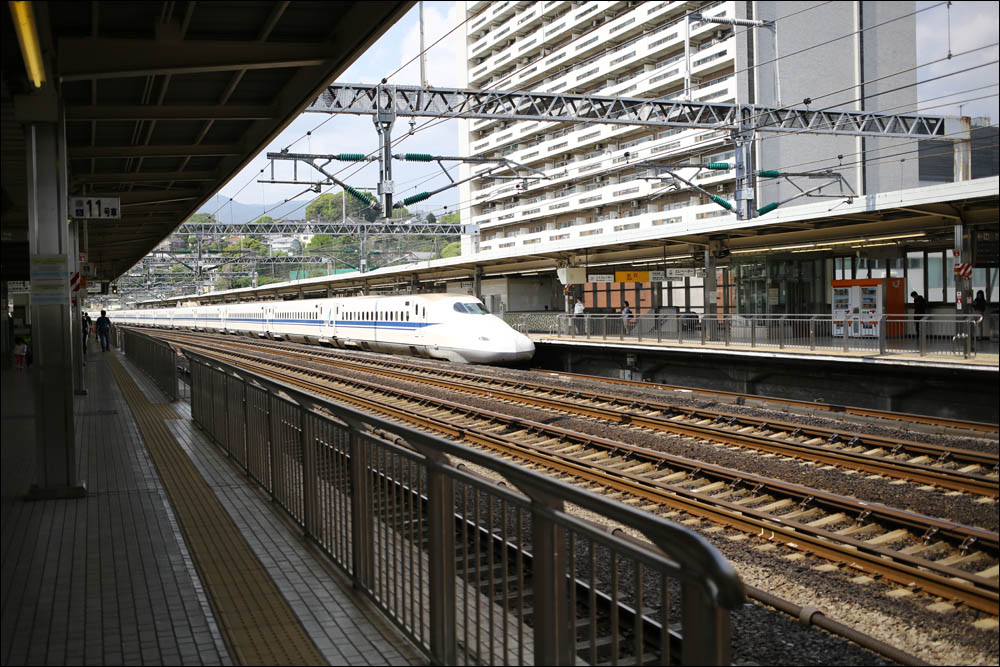
Religion: Shinto for good things, Buddhism, when you have current problems, Christianity for marriage.
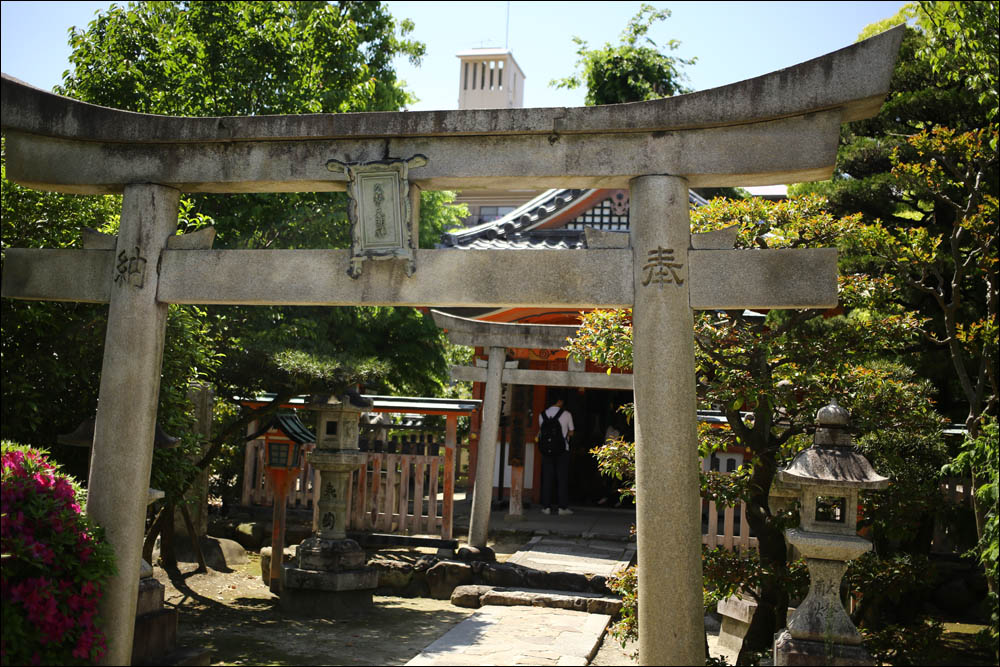
With all the aesthetics on sales the same hell, as we have:

And here is the aesthetics:
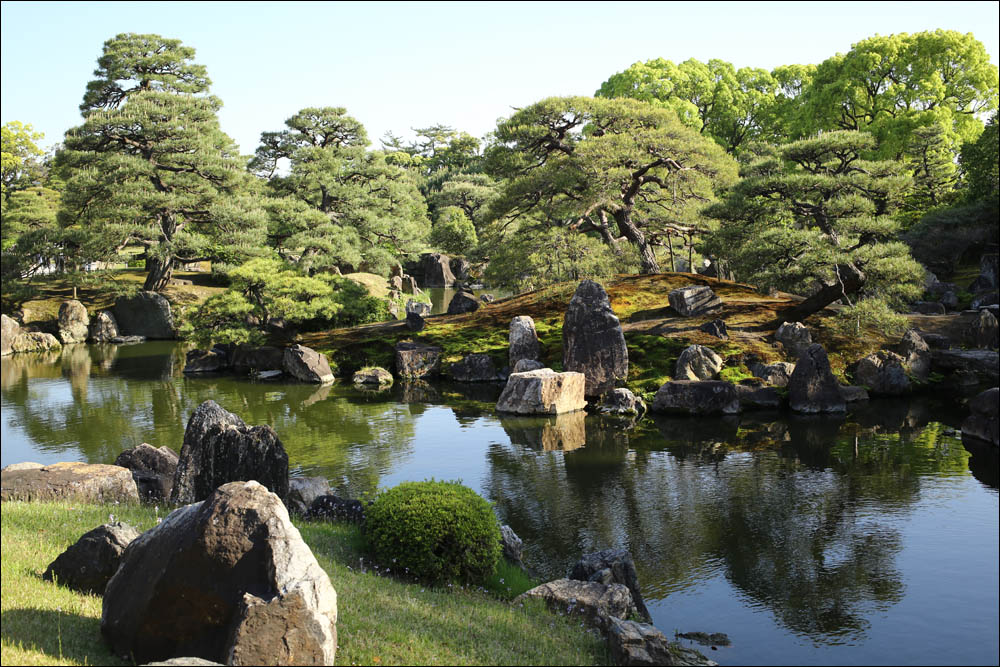
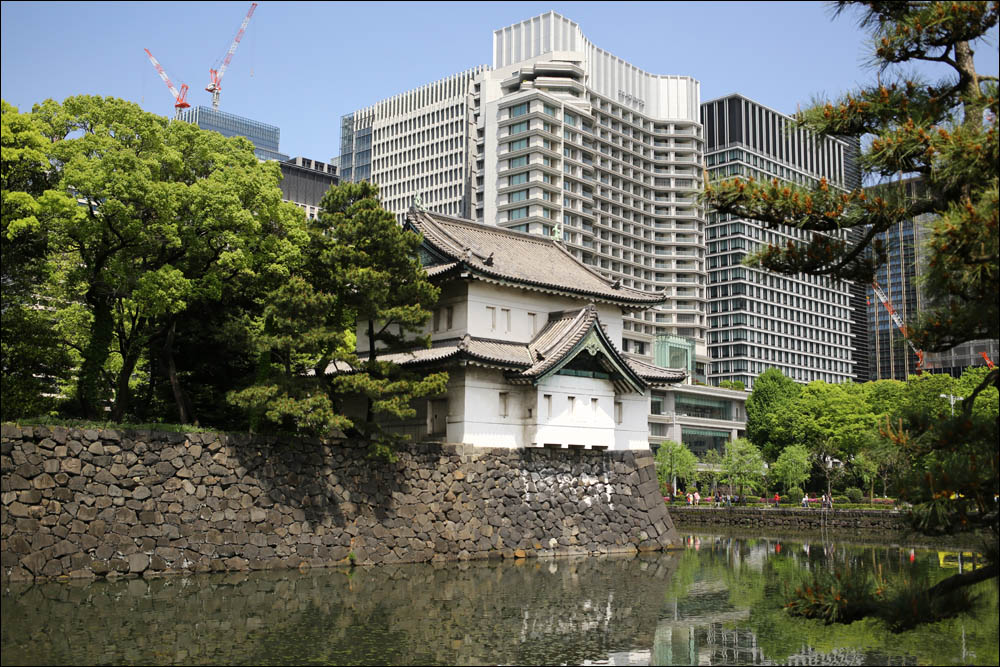
One of the few cats. Keep them expensive:

In general, a very strange country. The fact that half the time it seemed to me that I did not leave Russia anywhere (only for some reason, around the future), and then from time to time there were things that are not in our time. But it was all very logical. If you think cynically enough, of course, and in some places are ready to depart from the usual morality.
Source: https://habr.com/ru/post/453598/
All Articles